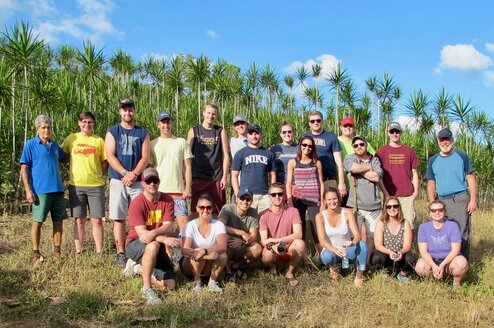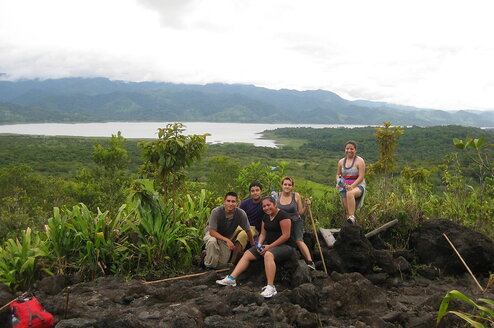Teach English in San Jose, Costa Rica
Teaching Programs in San Jose
About
Do you love waking up early, surrounded by mountain landscapes? When you go on a walk, are you hoping to meet friendly passerby’s, and then stumble upon an abundance of tropical flowers and fruit trees? Are fresh organic fruits and vegetables exactly what you need on a Sunday morning?
San Jose, Costa Rica and the surrounding cities may be the perfect place for you. Costa Rica is known for its “gallo pinto” (rice and beans), coffee farms, temperate climate, and tourism - but there’s so much more to experience as a resident. San Jose is a busy, fast-paced city with equally as exciting suburbs nearby.
One of the best things about San Jose is that it’s not only the capital, but it is the hub of bus stations and people going places. One could quite literally say, “All roads lead to San Jose.” If you are looking for a teaching job as well as adventure on the weekends, a bus from San Jose can take you to a stunning beach one week and to a cloud forest or a volcano the next.
Most of all, San Jose is hungry for English and other world languages. They are hungry for more opportunities and many see English and other languages as the key to opening those doors. You can make a difference by helping to open up doors of opportunity for the Ticos (Costa Ricans) in and around San Jose.
In order to teach English in San Jose, most teachers will require TEFL certification. The average salary for teaching in San Jose is $300 - $1,000 per month.
Job Types
The most popular teaching options in San Jose, Costa Rica all include teaching English or teaching another subject in English. Primarily, there are a large variety of private international schools as well as private language learning institutes for university students and adults.
International Schools:
Costa Rican international schools seek teachers of all subjects, primarily teaching candidates who are global citizens, able to adapt to different cultures and locations. Besides teaching the standard subjects of math or science, teachers of music, art, and special education are needed.
Take a look at the United World College and Blue Valley School for employment opportunities. International schools often require that their teachers have a few years of experience and preferably hold a master's degree in their subject.
Language Schools:
English language schools and academies are looking for native English speakers, who are TEFL/TESOL/CELTA certified. Since San Jose is Costa Rica's largest metropolis, many students are hoping to learn the language for work or professional reasons. A few language schools provide English language courses to clients at large companies, such as Whittemore de Costa Rica.
Universities:
In San Jose, there are several universities where teachers can provide English language instruction to university students. College students often take semester-long or summer-long courses to improve their spoken or business English. Keep an eye out for job availabilites at Universidad de Costa Rica and Universidad Internacional de Las Americas.
Find a Job
Qualifications:
Most schools require at least a Bachelors degree, an accredited teaching certification, and a few years of prior teaching experience. They also prefer native English speakers and TEFL (Teaching English as a Foreign Language) certified workers.
Salary & Cost of Living:
The average pay for teachers in Costa Rica is $800-$1200 USD per month. The pay could be more or less than that depending on the school. Private tutoring can pay as much as 10,000 colones an hour ($20/hour).
The average cost of housing in and around San Jose ranges from $500-1000 USD per month. Some of the best “ex-pat” neighborhoods are in Escazu and Santa Ana (about 15 min outside of San Jose). Many jobs provide optional housing or homestays with local families (meals included) for an extra fee averaging around $500. However, if you prefer more independence, there are plenty of postings on craigslist and other housing websites for rooms, apartments, condos, and houses available for rent.
In order to minimize costs, it is important to “live like a local”. Many people say that the cost of living in Costa Rica is very cheap. In reality, if you want the store bought luxuries (such as prepackaged items, toiletries, and clothing) that you enjoy from home, your imported lifestyle can be very pricey. The best way to save money is by taking advantage of the weekly fresh market fairs.
You can get a bus to just about anywhere for a little less than $1 or you can go by taxi for a little larger fee. An average restaurant meal is about 3,000-5,000 colones ($6-$10). Surprisingly, the rate for seeing a movie is only about $5! Overall, living in Costa Rica you will most likely “break even” rather than save up a lot of funds. It is advised that teachers come to Costa Rica with a few “back up” funds to start on.
Need to Know
Classroom & Work Culture:
The Costa Rican culture is defined by their common catch phrases, “pura vida” (direct translation: pure life; meaning: take it easy, enjoy life, it’s all good), “tranquila” (no worries), and “tenga paz” (have peace). It varies from school to school, but in general the culture in schools are a little more relaxed. Many things in the country run on “Tico Time” (not as much attention is given to time and punctuality). As it is a school, there will be structure, but make sure that you can be flexible and handle the “organized chaos”. Unlike their regard to time, Costa Rican’s are very neat. Do not be surprised if your school expects you to have your things and your students’ things organized, all the time.
In regards to dress code, the Tico culture puts a lot of emphasis on appearance. Costa Ricans make sure that they look nice no matter where they go. High-heels are common for every activity, including teaching. They may not judge you if you choose to wear flats, but make sure your outfit is put together nicely.
In a business setting, handshakes are normally given all around. However, after the first meeting, women are greeted by all with a kiss on the cheek. Unless very close friends or family, men continue to simply greet one another with handshakes.
It is important to note that if you choose to come work in an International School, you will experience many cultures blended together; a hybrid of sorts. Thus, it is always important to find out your expectations at the beginning so that you will be able to meet your specific employer’s requirements.
Contributed by Lauren Lindsley
What People Are Saying
New Teaching Jobs
View the latest teaching job postings on our job board.
Related Teach Abroad Articles
Frequently Asked Questions
-
Is it expensive to live in Costa Rica?
No. While it may be more expensive than other Latin American countries, the average monthly rent for a city center apartment is around $300-$600 USD. As an English teacher in Costa Rica, you should be able to live comfortably if you are frugal.
-
How do I get a work visa for Costa Rica?
To get a work visa in Costa Rica, a school or company must sponsor you. You will have to fill out an application, attach the school's statement of work, and provide proof that you don't have any debt in Costa Rica. Work visas last for six months and can be renewed.
-
Do you need a degree to teach in Costa Rica?
No, generally, you do not need a four-year college degree to teach English in Costa Rica. Many teaching positions do not have this requirement. However, it's a good idea to take a TEFL course to be more competitive for job opportunities.
-
How do I become a teacher in Costa Rica?
To become an English teacher in Costa Rica you should be a native speaker and have a TEFL certificate. Although a teaching certificate isn't required, it will open more job opportunities to teach English abroad.


















